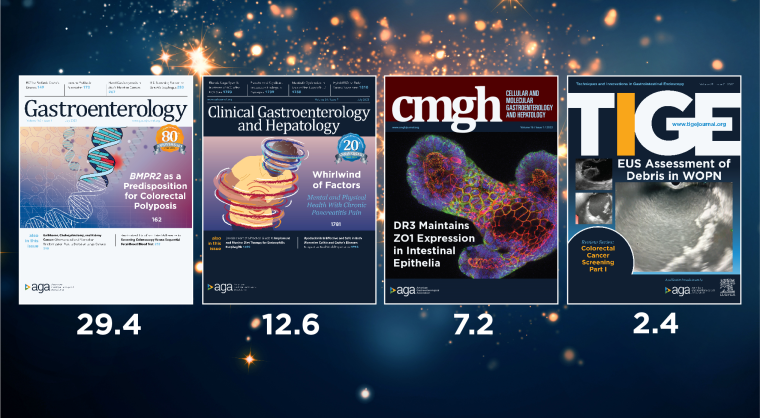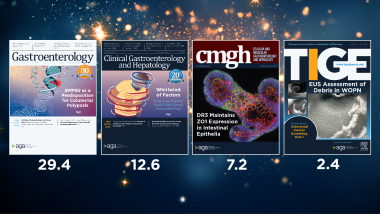(BETHESDA, MD) July 7, 2023 — AGA is proud to announce that our journals have maintained their exceptional standing in the field of gastroenterology and hepatology, based on Impact Factor. The Impact Factor is a measure of the frequency with which articles published in the previous two years are cited and is commonly used to rank the significance of journals within their fields.
Techniques and Innovations in Gastrointestinal Endoscopy (TIGE), AGA’s quarterly journal that focuses on providing a comprehensive overview of clinical conditions and gastrointestinal endoscopic procedures, has received its first Impact Factor of 2.4. This debut is a testament to the great work of the current co-editors-in-chief (EIC), Vinay Chandrasekhara, MD, AGAF, FASGE, and Michael L. Kochman, MD, AGAF, FASGE.
Drs. Chandrasekhara and Kochman reflected, “We are thrilled that Clarivate has provided journals in the Emerging Sciences Citation Index with impact factors this year. As a growing journal, the inclusion of TIGE will further increase the journal’s presence.”
Gastroenterology, AGA’s flagship journal, received a record high Impact Factor of 29.4. Gastroenterology maintains its position among an elite group of journals focused on publishing original research, spanning basic to clinical, in our field. Co-EICs Paul Moayyedi, MD, PhD, and David S. Weinberg, MD, MSc, remark, “Remaining one of the top journals in GI and hepatology is due in no small part to the outstanding work of our authors, reviewers, board of editors and editorial board. We are thrilled to maintain our position as the leading journal in the field and look forward to continuing to publish high-impact research.”
Clinical Gastroenterology and Hepatology (CGH), AGA’s clinically focused journal, also reached a record high with an Impact Factor of 12.6, continuing as the field’s top exclusively clinically oriented journal. Charles J. Kahi, MD, EIC of CGH, notes “Clinical Gastroenterology and Hepatology remains at the top thanks to true teamwork! Thanks to our authors, reviewers, readers and editorial team. We will continue to work relentlessly to publish the best of GI science.”
Cellular and Molecular Gastroenterology and Hepatology (CMGH), AGA’s basic and translational open-access journal led by EICs Klaus Kaestner, PhD, and Michael Pack, MD, maintained a strong position in the field with an impact factor of 7.2.
AGA congratulates and thanks the boards of all four journals for their editorial leadership. We also thank our authors, readers and reviewers for their continued support of AGA’s journals. We look forward to continuing to push the envelope in scientific publishing in the upcoming year.
###
Contact for media: Rachel Shubert, [email protected]
About the AGA Institute
The American Gastroenterological Association is the trusted voice of the GI community. Founded in 1897, the AGA has grown to more than 16,000 members from around the globe who are involved in all aspects of the science, practice and advancement of gastroenterology. The AGA Institute administers the practice, research and educational programs of the organization. www.gastro.org













